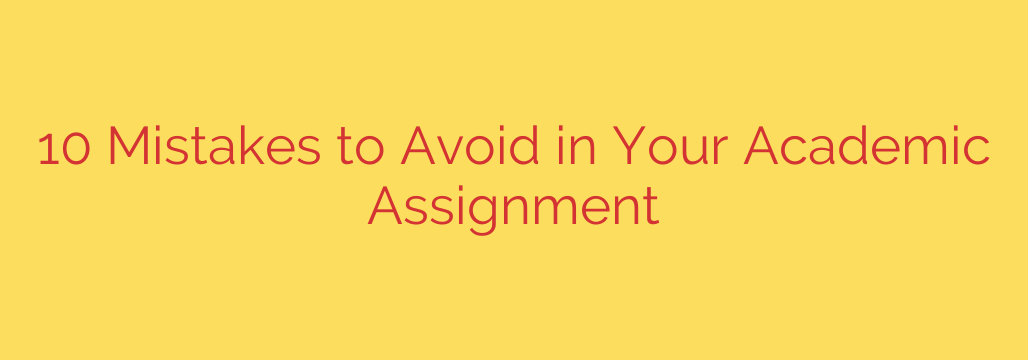
To produce truly outstanding academic work, it’s essential to sidestep common pitfalls that can undermine even the most brilliant ideas. Mastering the art of crafting successful assignments involves being mindful of several key areas. Avoiding these ten frequent errors will significantly elevate the quality and impact of your submissions.
First, a fundamental mistake is failing to fully understand the question or prompt. You must dissect the requirements carefully, identifying keywords and scope to ensure your response directly addresses what is being asked. Don’t start writing until you are absolutely clear on the task.
Next, poor time management is a major obstacle. Rushing the process leads to inadequate research, superficial analysis, and last-minute stress. Break down the assignment into smaller, manageable steps – understanding the prompt, research, outlining, drafting, revising, and proofreading – and allocate realistic deadlines for each stage.
Often, students make the error of conducting insufficient or irrelevant research. Your arguments need robust support from credible academic sources. Go beyond basic web searches; explore academic databases, scholarly articles, and reputable books to build a strong foundation for your points.
Ignoring submission guidelines is a self-sabotaging mistake. Pay close attention to formatting requirements, word count, file types, and submission methods. Failure to adhere to these details can lead to penalties, regardless of content quality.
One of the most serious errors is plagiarism, presenting someone else’s work or ideas as your own without proper attribution. Always acknowledge sources through correct citation methods (like APA, MLA, Chicago, etc.) and understand how to effectively paraphrase and summarize without copying. Upholding academic integrity is paramount.
A poorly structured or disorganized assignment confuses the reader and weakens your argument. Plan your essay or report logically with a clear introduction, body paragraphs that develop distinct points, and a strong conclusion. Use topic sentences and transitions to create a smooth flow.
A weak introduction or conclusion diminishes the impact. The introduction should hook the reader, provide necessary background, and clearly state your thesis or main argument. The conclusion should summarize key points, reiterate your thesis in new words, and offer a final thought or broader implication, avoiding new information.
Errors in referencing and citations are common but easily avoidable. Maintain meticulous records of your sources during the research phase. Use a consistent citation style throughout your assignment and ensure your bibliography or works cited list is accurate and complete.
Simply summarizing information without engaging in critical analysis is another pitfall. Academic assignments require you to evaluate, interpret, synthesize, and critique the evidence. Don’t just present facts; discuss their significance, explore different perspectives, and develop your own insightful arguments.
Finally, neglecting proofreading is a costly mistake. Typos, grammatical errors, and awkward phrasing detract from your professionalism and clarity. Always leave time to carefully read through your work, preferably after a break, and consider using grammar checkers or asking a peer to review it.
By consciously avoiding these ten common errors, you set yourself up for academic success, producing assignments that are not only accurate and well-supported but also clear, professional, and impactful. Focus on precision, planning, integrity, and polish to truly make your work stand out.
Source: https://kifarunix.com/10-mistakes-that-can-spoil-your-academic-assignment/








